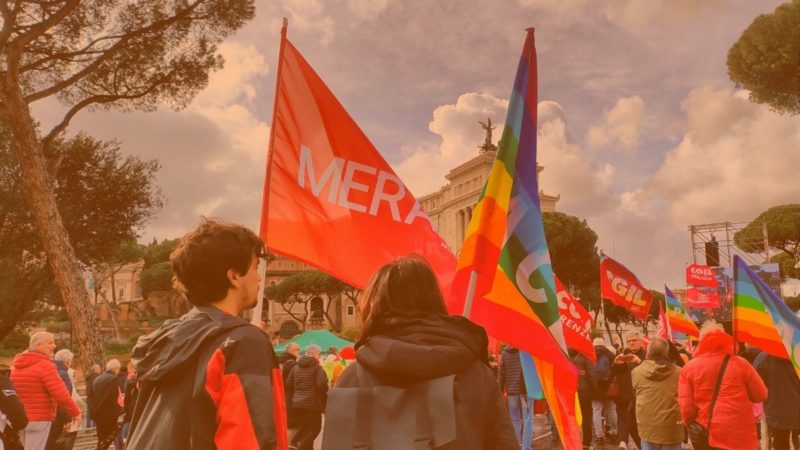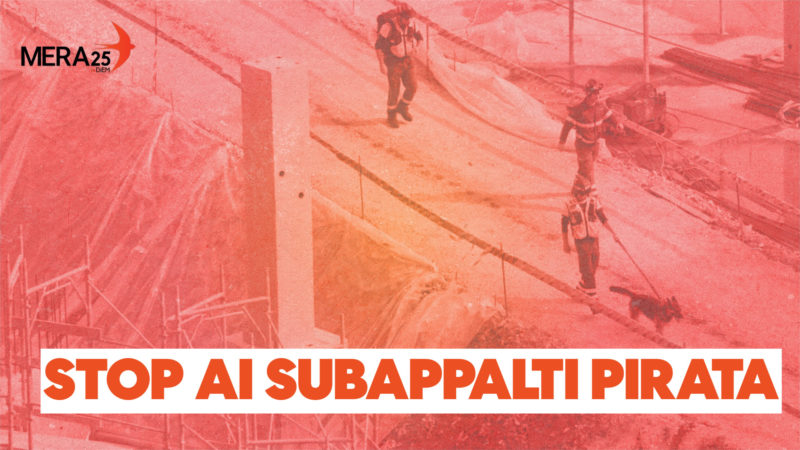On 19 March, Mario Draghi held a press conference at Palazzo Chigi to present a bill containing the highest tax amnesty in the last five years
Whilst the 32 billion appropriation for the decree had been “found” by Giuseppe Conte, three months after the last Ristori Decree, the ‘government of the best’, well behind schedule, presented its “Significant, very substantial response to poverty”.
Draghi was initially asked by Forza Italia and Lega, to indiscriminately cancel tax liabilities that should have been paid to the Treasury in the years 2000-2015. In the Support decree issued in the Official Gazette on March 22, liabilities with a residual amount of 5,000 euros are cancelled for tax evaders. The highest tax amnesty in recent years, as estimated by Skytg24, amounting to 58 billion euros.
Whereas Conte’s team were derided by the media in the past for the motto “We shall abolish poverty” associated with the citizenship income (basic income), few have challenged Draghi’s response to poverty which is basically nothing more than a tax amnesty. The media managed to find another reason to sanctify Draghi, praising his frankness when other governments attributed romantic epithets, such as Fiscal Peace, to the cancellation of tax bills.
A meaningful response to poverty? Draghi, “Words matter!”
Preliminary statistics from 4 March 2021 point out a tough headline: One million more people in absolute poverty in 2020. The incidence of absolute poverty is calculated on the minimum monthly expenditure needed to acquire a basket of goods and services. To provide an example, the poverty threshold for a three-person household in Milan is 1,578 euros. According to the Italian National Institute of Statistics, 335,000 households crossed the threshold of absolute poverty from 2019 to 2020.
There is also another form of poverty that has been on the rise in recent years, and that’s homelessness, of which we have little data. According to the last ISTAT survey of 2015, the estimated homeless population in Italy is 50,724 people, with Milan and Rome “hosting” nearly 40 percent of them. We opened January 2021 with the dramatic news of 9 frostbite deaths in the streets of Rome, whilst a month later a 75 year-old man died of hypothermia in Milan. What measures has the government taken for these poor people in the midst of a pandemic? Fines.
There has been no shortage of surreal news of 400 euro fines to the homeless. In the meantime, Italians have shown solidarity in every possible way: large baskets with bread, water, and face masks provided by citizens, bakeries and food stores, made available in the streets. There are places that have changed shape to help the most vulnerable. It is the case of an Arci club in Rome that was transformed into a night shelter for the homeless and, according to Ansa, has triggered a vortex of solidarity in the neighbourhood. Is this the sort of poverty Mario Draghi intends to combat through the tax amnesty?
The Minister of Economy and Finance, Daniele Franco, announced in a meeting with Bloomberg that in the coming quarters, government aid will even be reduced. In the slow return to “normality” the government intends to interrupt redundancy payments, freeze reliefs and economic support to commercial activities. In the “normalisation” of Draghi’s dreams, citizens struggle alone for survival.
According to the teachings of the British economist John Maynard Keynes, poorer households are the ones with the highest propensity to consume, so subsidies to them immediately turn into aggregate demand. A study conducted by the Bank of Italy, shows indeed that in absence of social protection measures, inequality in our country would dramatically increase.
With regard to the tax amnesty, some scientific studies suggest avoiding this measure since it entails further costs for the state. Moreover, among tax reductions, it seems to be the least effective. The Italian Prime Minister has constantly repeated the mantra of good debts – bad debts, without ever providing us with practical examples. Eventually the chickens come home to roost.
It is questionable, however, how a tax amnesty should combat poverty. Specifically:
1- If most of the fiscal credits are uncollectible as Draghi himself says, with the debtors being deceased, bankrupt or having no intention of paying, it is not clear how this would bring money into the pockets of people who are living below the absolute poverty threshold;
2- How does the tax amnesty in the Support Decree, theoretically linked to the pandemic, help those who are suffering economically because of the current crisis, when the cancelled tax bills refer to the decade 2000-2010?
3- It is true that there is an income ceiling of 30,000 euros to benefit from the amnesty. We are certain, however, that the government is well aware that tax evasion in Italy is not only present through the non-payment of taxes, but also through fraudulent tax returns and irregular employees. These are behaviours which trigger immense costs for our society and economy.
With the latest decree, the government has opted for an unfair measure that further opens the door to moral hazard in the area of tax evasion
The decree provides for a reform of debt collection to combat tax evasion that should be presented within 60 days. In the meantime, however, doubts remain. For example, why does the Premier want to eliminate cashback – an incentive for electronic payments which refunds a quote of the expenses made by debit/credit card to households?
The 2020 report by the Ministry of Economy and Finance on Unobserved Economy and on Tax and Contribution Evasion indicated that “the microeconomic analysis confirms the existence of a causal link between the increase in VAT revenue and the introduction of the obligation of electronic invoicing”. At the urging of Forza Italia and Lega parties, Draghi seems intent on cancelling a form of incentive for electronic invoicing.
The economy that Draghi supports has nothing to do with Keynes. The obsession with the deficit and the cancellation of tax credits are perfect examples of how the government aims to limit state intervention in the economy. So, in the midst of a pandemic, they tell us that in order to fight poverty they will cancel debts and penalties to tax evaders.
According to the economic theory that the government follows, more state spending today means more taxes tomorrow. The climax will be when Draghi announces that in order to pay today’s deficit (of which the amnesty is a part) taxes will have to be raised for everyone.
Yet, he himself declared in 2010 that “The amnesty is a brake on growth because it requires higher taxes for those who pay them, reduces resources for social policies, hinders interventions in favour of citizens with modest incomes.” And he was right, cutting taxes to tax evaders does not generate growth in a deep crisis such as the current one, nor can it help to fight poverty. For those who did not pay taxes, the cancellation of the liability does not constitute a relief or a stimulus to consumption/investment, since that money would have never entered the coffers of the State.
Keynes said, “The avoidance of taxes is the only intellectual pursuit that still carries any reward.” The reward, however, is paid by the community for the benefit of the less honest. If Draghi were actually a Keynesian, he would further stimulate household spending by poor families, giving a boost to aggregate demand and nurturing expectations for a rapid recovery through policies which are consistent with the principle of equality in its substantial meaning as formulated in the Italian Constitution.
The data, the statements of Draghi himself, and the first measures implemented show us a fragile Prime Minister who needs the private consultancy of McKinsey to draw up a recovery plan for the country, and denies his convictions in order to please the “varied majority” that supports him.
Do you want to be informed of DiEM25's actions? Sign up here



